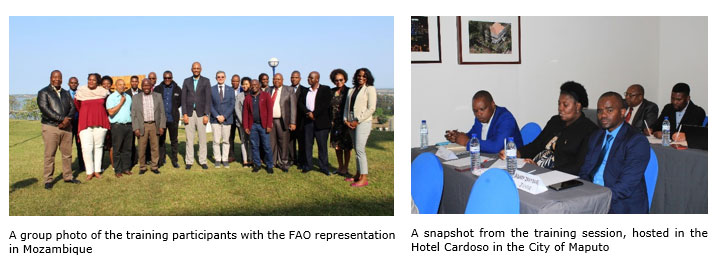Mastering fisheries co-management: the first training experience in Mozambique

Achieving effective fisheries co-management requires continuous feedback of information to generate positive impacts on economies and livelihoods, while minimizing resource usage (human, financial, and environmental). The evaluation of co-management effectiveness provides a structured methodology for gaining insight from both successful and unsuccessful experiences and facilitates the understanding of why co-management practices are being adapted.
After the creation of a complete set of tools to evaluate fisheries co-management effectiveness, the Smart Fisheries Co-management (SFC) project is now starting a series of trainings on the ground to enhance the participants’ capacity for evaluating the performance of a fisheries co-management system. The preparation of the training was supported by RARE, an organization which focuses on the revitalization of coastal communities in several countries, including Mozambique.
The first training session was held in Maputo, Mozambique, on 23 June 2023, with virtual participation also available. The training was attended in-person by 20 participants, including technicians from the Administração Nacional das Pescas (ADNAP), the Instituto Nacional de Desenvolvimento de Pesca e Aquacultura (IDEPA) and Instituto Nacional da Marinha (INAMAR).
Participants have undergone a comprehensive training program to equip them with the knowledge and skills necessary to evaluate and enhance fisheries co-management practices.
The program encompassed various lessons, from fisheries co-management definition and its relation to the ecosystem approach to fisheries, to the difference between fisheries management and co-management, and the importance of evaluating fisheries co-management and developing effective evaluation frameworks. The final lesson introduced participants to the practical aspects of evaluating fisheries co-management. The detailed program can be found here.
Participants provided overall positive feedback on the course, expressing their appreciation for its usefulness. The overall assessment ranged from useful and very useful. One participant shared “The training was beneficial as it provided tools for working in the field with communities for planning, monitoring and evaluation. Above all, I have learned that in the process of evaluating co-management systems, the mistake cannot be seen as an alarm”. “It can help us in improving the level of our intervention in the coastal communities towards changing of behaviour in the processes of management and planning” added another participant. Attendees recognized the contribution of fisheries co-management to a more sustainable and responsible management of resources at the community level: “It will help to bring more actors and will improve our interventions in issues related to management of fishing communities” affirmed a technician from ADNAP. Most attendees requested additional session to gain a better insight on the evaluation process itself and more practical lessons.

The training programs offer a comprehensive and structured approach to understanding and evaluating fisheries co-management. By providing participants with in-depth knowledge, practical skills, and evaluation strategies, SFC aims to enhance the effectiveness and sustainability of fisheries co-management practices already in place in the target countries and to promote the use of these practices in fisheries communities where is not yet applied.
Interested in the matter? Delve into the knowledge tools we developed and don’t miss the chance to gain the certified badge through the accomplishment of the e-Learning course!
Guidebook for evaluating fisheries co-management effectiveness
E-learning course: Evaluating fisheries co-management effectiveness
Guidebook for evaluating fisheries co-management effectiveness - How it works
Toolbox for the Guidebook for evaluating fisheries co-management effectiveness

